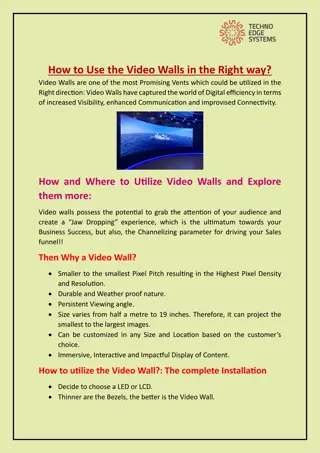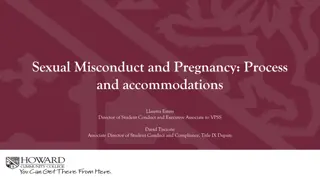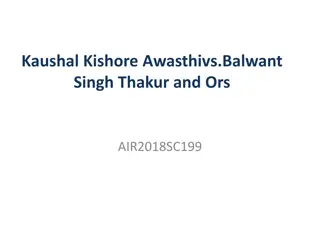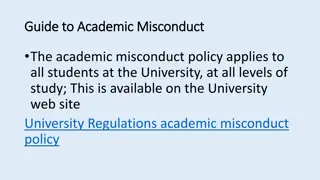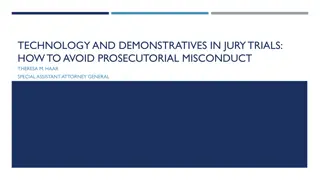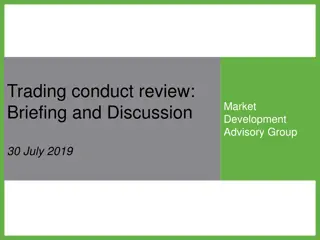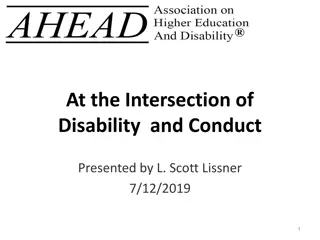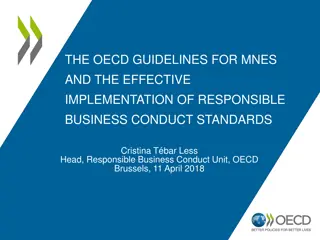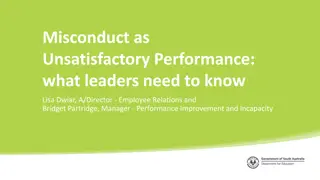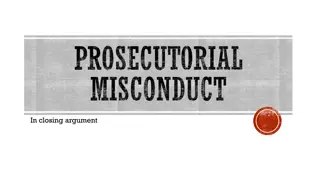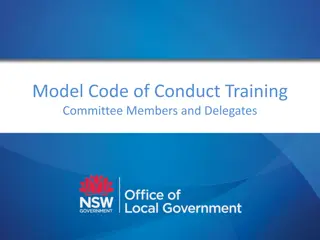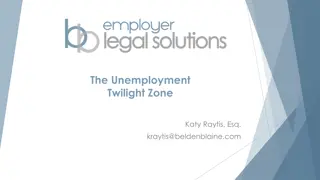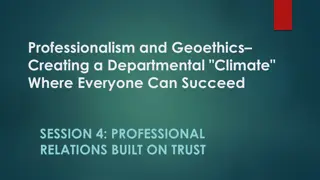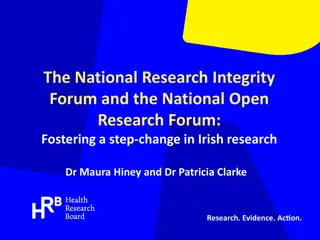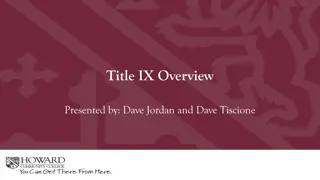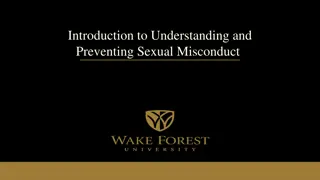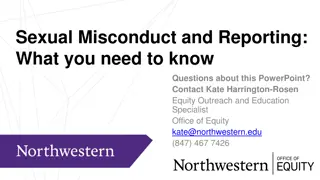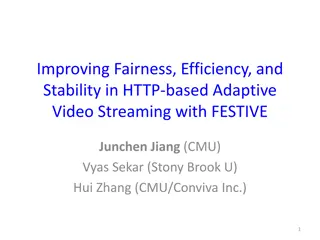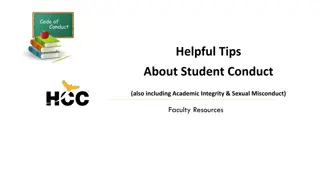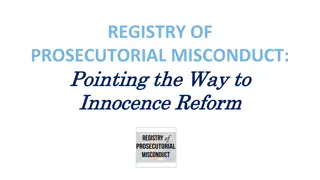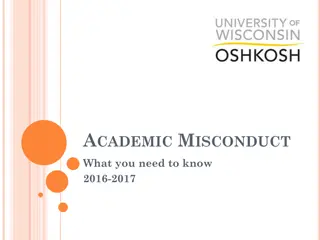
Understanding Research Misconduct and Reporting Requirements
Learn about research misconduct defined by the Office of Research Integrity (ORI) including fabrication, falsification, plagiarism, and reporting requirements. Discover the importance of addressing wrongdoing and the necessary procedures for handling research misconduct within institutions.
Download Presentation

Please find below an Image/Link to download the presentation.
The content on the website is provided AS IS for your information and personal use only. It may not be sold, licensed, or shared on other websites without obtaining consent from the author. If you encounter any issues during the download, it is possible that the publisher has removed the file from their server.
You are allowed to download the files provided on this website for personal or commercial use, subject to the condition that they are used lawfully. All files are the property of their respective owners.
The content on the website is provided AS IS for your information and personal use only. It may not be sold, licensed, or shared on other websites without obtaining consent from the author.
E N D
Presentation Transcript
Research Misconduct Information for this module came from the Office of Research Integrity (ORI) website: https://ori.hhs.gov/content/chapter-2- research-misconduct-introduction
Objectives Participants will be able to: Define research misconduct Give examples when research misconduct occurs Describe the requirement for reporting research misconduct 2
Overview The Department of Health and Human Services (DHHS), Public Health Services (PHS) and policies on research misconduct (42 CFR Parts 50 and 93) Identify three forms of wrongdoing which fall under the federal definition of research misconduct falsification, fabrication and plagiarism 3
These forms of research misconduct are defined as follows: Fabrication making up data or results and recording or reporting them Falsification manipulating research materials, equipment, or processes, or changing or omitting data or results such that the research is not accurately represented in the research record Plagiarism appropriation of another person s ideas, processes, results, or words without giving appropriate credit (45 CFR 93.103) 4
Research misconduct also includes the following: Significant departure from accepted practice Committed intentionally, knowingly, or recklessly Proven by a preponderance of evidence NOTE: Individuals who report research misconduct in good faith cannot be penalized. 5
Institutions are required to have the following: An individual who receives allegations of misconduct Individual(s) who investigate misconduct Procedures for a formal investigation into determining whether the allegations are true Individuals who make final conclusions about the allegations and who take steps to address the misconduct An individual who reports the misconduct to the Office of Research Integrity 6
As a general rule, research misconduct allegations must not be made public until they have been fully investigated and confirmed. There are, however, exceptions to this rule. If the misconduct could pose a threat to public health or safety, such as misconduct in a clinical trial, it must immediately be brought to the attention of the person heading the trial, the person with oversight authority, or both. If this is the case, regulatory agencies must be notified immediately. In such cases, the names of the persons charged should remain confidential, but steps must be taken to safeguard subjects in the trial. 7
Reporting Requirements All faculty, staff, and students will report observed, suspected, or apparent research misconduct to the Research Integrity Officer (RIO). If an individual is unsure whether a suspected incident falls within the definition of research misconduct, they may confer with the RIO about concerns of possible misconduct and will be counseled about appropriate procedures for reporting allegations if deemed appropriate. An individual may also initially meet with, or contact, the RIO to discuss the suspected research misconduct informally, which may include discussing it anonymously and/or hypothetically. 8
DEPARTMENT OF HEALTH AND HUMAN SERVICES Office of the Secretary Findings of Scientific Misconduct ACTION: Notice SUMMARY: Notice is hereby given that the Office of Research Integrity (ORI) and the Acting Assistant Secretary for Health have taken final action in the following case: Eric T. Poehlman, Ph.D., University of Vermont: Based on the report of an investigation conducted by the University of Vermont (Report), admissions made by the respondent, and additional analysis conducted by ORI in its oversight review, the U.S. Public Health Service (PHS) found that Eric T. Poehlman, Ph.D., former Professor, Department of Medicine at the University of Vermont College of Medicine, engaged in scientific misconduct in research. The research was supported by National Institutes of Health (NIH) grants from the National Institute of Aging (NIA), the National Institute of Diabetes and Digestive and Kidney Diseases (NIDDK), and the National Center for Research Resources (NCRR). Specifically, PHS found that the respondent is responsible for scientific misconduct by engaging in the misleading and deceptive practices. Office of Research Integrity. Case Summary-Eric Poehlman, 2005 9
When research misconduct occurs in federally funded research (including proposals), it is a federal crime that can be punished severely resulting in: Fines Loss of funding eligibility Imprisonment https://ori.hhs.gov/rcr-casebook-research-misconduct 10
Case Example (1) Dr. Edwards lab had always prided itself on its extraordinary research. During a weekly lab meeting one of the technicians presented data from two experiments. The data presented from experiment 1 appeared to be identical to the data from experiment 2. Dr. Edwards spoke with the lab technician who claimed that she had performed two experiments and that the data just happened to look the same. 11
Case Example Questions (1) What should Dr. Edwards do now? Do you think that the lab technician is telling the truth? 12
Case Example (2) Dr. Frank conducts medical research in the area of sleep disorders. After careful thought and review of the literature he writes a protocol around a novel use of a sleep therapy. He asks his colleagues to review the protocol. A short time later he finds that one of his colleagues has submitted his protocol as his own to a federal funding agency. 13
Case Example Questions What should Dr. Frank do? Do you think that what his colleague did was dishonest? 14
Role Play: This is a 2-person role play involving an associate professor and a former PhD student Roles: Professor Former PhD student https://ori.hhs.gov/case-four-accusations- falsifying-data 15
This role play involves a young Associate Professor of biochemistry at a major research university. He devotes all his time to establishing his scientific career. He has developed his lab into a highly successful scientific enterprise that is turning out world class publications. He has remained in close touch with his former PhD advisor and thinks of their relationship as a warm mutual friendship. His former advisor tells the professor that one of his former PhD students, has fallen on hard times. He d lost his first academic appointment and is now driving a cab in the city where the professor lives. The former advisor suggests that the professor hire the down-and-out guy who is 15 years his senior and practically homeless. 16
Character Description: Professor You are well known in your research field and provide excellent research. You decide to take your former mentor s advice and hire your PhD student. Your student s performance is poor and after stating his expectations, the student produces data that fits a little too well with the hypothesis. https://ori.hhs.gov/case-four-accusations- falsifying-data 17
Character Description: Former PhD Student Allen is hired by is former mentor. He has been in the lab for approximately 6 months. His work is poor and he resents any input or supervision. The former student insists that his work is superior to the work of others and makes remarks about the work of the other students. https://ori.hhs.gov/case-four-accusations- falsifying-data 18
Scenario One Professor: I was just looking at the recent data you produced. I asked another student to gather more data. The other student s data does not resemble your data at all Former PhD student: How do you respond? https://ori.hhs.gov/case-four-accusations- falsifying-data 19
Scenario Two Former PhD Student: You thought you could cross me, didn t you? I just sent this. He hands a letter to the professor. The letter is addressed to the Dean of Academic Affairs accusing the professor of having falsified data for the last two years. Professor: How do you respond? ------------------------------------------------------------------------------------ Discussion Questions for the Facilitator - What factors might influence the way the Dean perceives this situation? - Is it important for the Dean to take such allegations seriously, however illogical they may seem? - What kind of documentation would be useful when dealing with a person such as Allen? - When should such documentation begin? - At what point might the professor seek the support of a lawyer - Should the professor inform others in the lab of Allen s accusation? https://ori.hhs.gov/case-four-accusations- falsifying-data 20
Summary While fabrication, falsification and plagiarism may seem complex; faculty, students and staff know it is wrong to lie (fabricate or falsify) and steal (plagiarize). Appropriate research conduct means taking research misconduct seriously and reporting research misconduct when necessary 23

